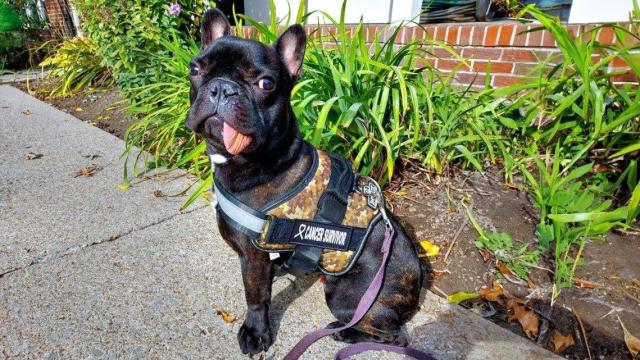A 3-month-old French bulldog named Tyson seems to have pulled off the miraculous. In a recent case report, Cornell University veterinarians describe how the pup spontaneously regrew most of his lower left jaw after it had to be removed to treat his cancer—the first time something like this has ever been documented in canines. Even better, Tyson remains cancer-free to this day.
The case is detailed in a report published in the journal Frontiers in Veterinary Science. According to the paper, Tyson was set to undergo a surgical repair of a cleft palate (an opening or split in the roof of the mouth) in spring 2023, when his primary vet incidentally found a malignant tumour along his left jaw. A biopsy soon revealed that Tyson had developed an oral papillary squamous cell carcinoma, the second-most commonly reported type of oral cancer in dogs.
Surgery is the standard treatment for these cancers, but his owners were hesitant to go ahead with it. The tumour’s placement meant the vets needed to remove most of Tyson’s lower left jaw, and it was unclear at first whether his cancer had progressed to the point where surgery was unlikely to work. Subsequent tests found that the cancer hadn’t spread elsewhere yet, though, raising hopes of a good prognosis for Tyson with surgery. So, with the family’s permission, the vets performed the procedure.
Tyson had no serious complications afterward. And to everyone’s surprise, his missing jaw began to grow back, bone and all, within the next eight weeks. There have been case reports of people growing back their jaws after similar surgeries or injuries, and some anecdotal tales of young dogs regrowing a small portion of their jaw. But as far the report authors know, this is the first such case of jaw regeneration ever documented in a dog following oral cancer surgery.
“We had no idea his jaw would grow back,” said Melissa Forsythe, one of Tyson’s owners, in a statement released by Cornell University.
The most likely factors in Tyson’s remarkable recovery, the team says, are his age and the fact that the surgery left much of the jaw’s periosteum—a thin membrane layer covering bone that contains the blood vessels nourishing it—intact. But the exact mechanisms behind the regeneration are a mystery.
“More has to be done to understand the likelihood of this occurring in other dogs and if a specific age range makes a difference,” said study author Alexandra Wright, a dentistry and oral surgery resident at Cornell who led Tyson’s care, in a statement. “But this case documents a very positive surgical outcome in a life-threatening situation.”
Tyson did have to undergo another surgery to repair his cleft palate, which was successful. And his new lower left jaw isn’t quite as functional as the old one, since it’s missing teeth. But it’s just as long as the right side and healthy, too; so far, the vets have found no evidence of the cancer returning. Tyson himself is living life to his fullest, according to Forsythe, having recently passed an obedience class and marching in a Christmas parade.
Both Tyson’s owners and the vets hope that his story can someday help doctors understand how to do the same for other dogs in a similar situation.
“His case now demonstrates the possibility of complete bone regeneration when working with a patient this young,” Wright said.
